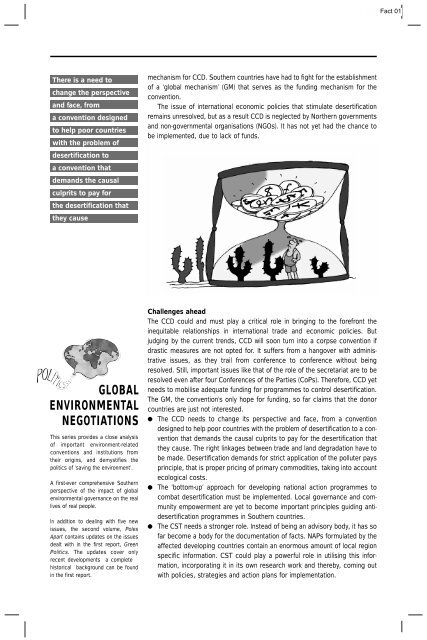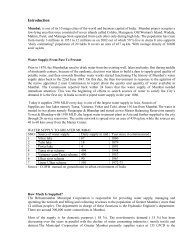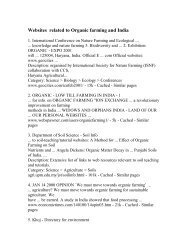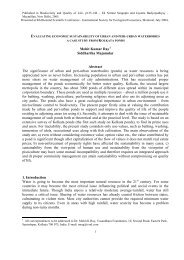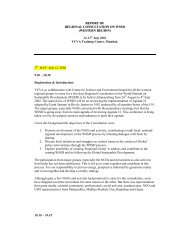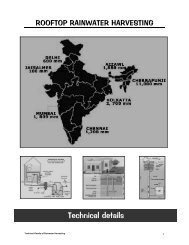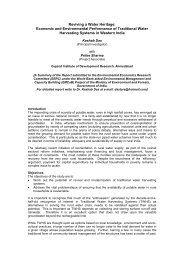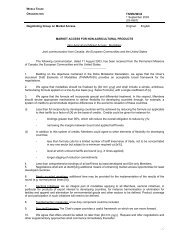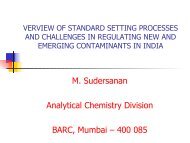DESERTIFICATION - Rainwater Harvesting
DESERTIFICATION - Rainwater Harvesting
DESERTIFICATION - Rainwater Harvesting
Create successful ePaper yourself
Turn your PDF publications into a flip-book with our unique Google optimized e-Paper software.
Fact 01<br />
There is a need to<br />
change the perspective<br />
and face, from<br />
a convention designed<br />
to help poor countries<br />
with the problem of<br />
desertification to<br />
a convention that<br />
demands the causal<br />
culprits to pay for<br />
the desertification that<br />
they cause<br />
mechanism for CCD. Southern countries have had to fight for the establishment<br />
of a ‘global mechanism’ (GM) that serves as the funding mechanism for the<br />
convention.<br />
The issue of international economic policies that stimulate desertification<br />
remains unresolved, but as a result CCD is neglected by Northern governments<br />
and non-governmental organisations (NGOs). It has not yet had the chance to<br />
be implemented, due to lack of funds.<br />
GLOBAL<br />
ENVIRONMENTAL<br />
NEGOTIATIONS<br />
This series provides a close analysis<br />
of important environment-related<br />
conventions and institutions from<br />
their origins, and demystifies the<br />
politics of ‘saving the environment’.<br />
A first-ever comprehensive Southern<br />
perspective of the impact of global<br />
environmental governance on the real<br />
lives of real people.<br />
In addition to dealing with five new<br />
issues, the second volume, Poles<br />
Apart contains updates on the issues<br />
dealt with in the first report, Green<br />
Politics. The updates cover only<br />
recent developments — a complete<br />
historical background can be found<br />
in the first report.<br />
Challenges ahead<br />
The CCD could and must play a critical role in bringing to the forefront the<br />
inequitable relationships in international trade and economic policies. But<br />
judging by the current trends, CCD will soon turn into a corpse convention if<br />
drastic measures are not opted for. It suffers from a hangover with administrative<br />
issues, as they trail from conference to conference without being<br />
resolved. Still, important issues like that of the role of the secretariat are to be<br />
resolved even after four Conferences of the Parties (CoPs). Therefore, CCD yet<br />
needs to mobilise adequate funding for programmes to control desertification.<br />
The GM, the convention’s only hope for funding, so far claims that the donor<br />
countries are just not interested.<br />
● The CCD needs to change its perspective and face, from a convention<br />
designed to help poor countries with the problem of desertification to a convention<br />
that demands the causal culprits to pay for the desertification that<br />
they cause. The right linkages between trade and land degradation have to<br />
be made. Desertification demands for strict application of the polluter pays<br />
principle, that is proper pricing of primary commodities, taking into account<br />
ecological costs.<br />
● The ‘bottom-up’ approach for developing national action programmes to<br />
combat desertification must be implemented. Local governance and community<br />
empowerment are yet to become important principles guiding antidesertification<br />
programmes in Southern countries.<br />
● The CST needs a stronger role. Instead of being an advisory body, it has so<br />
far become a body for the documentation of facts. NAPs formulated by the<br />
affected developing countries contain an enormous amount of local region<br />
specific information. CST could play a powerful role in utilising this information,<br />
incorporating it in its own research work and thereby, coming out<br />
with policies, strategies and action plans for implementation.


